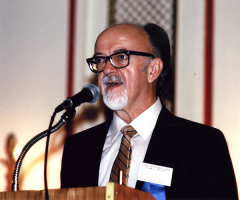Eyford, Dr. Glen
Presentations by Eyford, Dr. Glen
What I propose to do is provide a framework in which to think about development strategies and the ways in which they may or may not fit an existing society.
One of the main themes addressed in this session is that social change is not confined to individuals but should be viewed in light of the society or nation as a whole. Our dreams of an ideal of a "heaven on Earth:, sometimes called of the “Holy City” or the “New Jerusalem” is what we strive for.
Dr. Eyford explains that the book reviews—in Shoghi Effendi’s own words—“the history of the first hundred years of its [the Baha’i Faith’s] evolution [and] resolves itself into a series of internal and external crises, of varying severity, devastating in their immediate effects, but each mysteriously releasing a corresponding measure of divine power, lending thereby a fresh impulse to its unfoldment, this further unfoldment engendering in its turn a still graver calamity, followed by a still more liberal effusion of celestial grace enabling its upholders to accelerate still further its march and win in its service still more compelling victories.”
Dr Eyford recalls visits that he made to countries such as Cuba, China and Ecuador where he learned how to address the problems of life by consulting with the communities involved. From that he found specialists to provide expertise and technological support. He recalled that ‘Abdu’l-Baha had advised the Baha'is to share their learnings with others. We have amassed a great deal of knowledge and know-how about developing commerce but we don’t know how to transfer learnings from one community to another.
Dr. Eyford develops a continuum on which change takes place. He focusses on the social aspects of change. He describes five ways in which change, or development takes place in society. Violence, legislation or laws, public participation, education and culture are these five. Dr. Eyford uses “culture” for “spiritual” because it is less well understood by the general public.
Dr. Eyford discusses the vital role that education plays in order to move our world toward "The Most Great Peace". He describes the five ways in which learning is facilitated, as proposed by the Club of Rome; these five are: language, tools, values, human relations and images. Dr. Eyford points out how the ideas presented by the above-mentioned society are in harmony with the teachings of the Baháí Faith and emphasizes the need to develop the last three of these as the means of achieving "universal salvation”, rather than just personal salvation.

